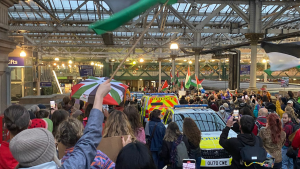
Workers for a Free Palestine: organising against the genocide
Charlie T and Jack N •Workers for a Free Palestine have organised pickets targeting the arms industry’s complicity in Israel’s genocide in Palestine. Charlie T and Jack N set out a case for worker outreach arguing that long-term, militant, anti-imperialist trade unionism is essential to confronting Zionism and rebuilding the left.
In October 2023, Workers For a Free Palestine (WFFP) emerged in response to a directive from the Palestinian General Federation of Trade Unions (PGFTU), calling for workers globally to cease the production and transportation of weapons to Israel, among other things. Britain’s trade union leadership failed to respond with the speed and breadth required to disrupt the crucial supply-chains linking our country’s arms industry to the intensification of Israel’s genocide. In its absence, WFFP organised several large pickets from an assortment of rank-and-file workers, mobilising at sites enmeshed within the Israeli war-machine in Kent, Rochester, Samlesbury, Govan, Brighton, and Bournemouth. Later on, we were to replicate these actions outside offices for the Department for Business and Trade and the Foreign, Development and Commonwealth Office in central London, demanding that the Labour government immediately impose an arms embargo.
During and following these efforts, we have sought to engage in the process of worker outreach, talking with workers in key strategic sectors such as logistics and arms. Our aims here are to develop anti-imperialist trade unionism, so that workers have the confidence and political orientations to refuse business-as-usual. While this slow mode of organisation can feel insufficient in the face of the continual horrors faced by Palestinians, we know that the power of working class solidarity enacted within our workplaces is a vital and necessary force in our struggles against Western imperialism and Zionism.
Barriers to worker mobilisation
Many workers we have spoken to have been wary about the possibilities of organising for Palestinian liberation in their workplace. This is not for lack of empathy, although there are those who simply aren’t aligned with our politics. For many, it is because they are scared of repercussions, have little experience within their trade unions, and see the anti-trade union laws as a barrier to the possibility of taking the kind of militant refusal we have witnessed in Greece, Barcelona, Italy, France, Belgium, and India. Yet there are a number of ways of framing such actions so that they ostensibly meet legal requirements. Our task, then, is not to persuade racists of Palestinian humanity – but to develop existing convictions people have, build their confidence as trade unionists, and model ways to overcome anti-worker legislation.
A guide to worker outreach
What does this work look like in practice? We will here focus on the granular practicalities of establishing your own practice of worker outreach. We have been focused on sites of arms production and circulation – though our model might be adapted to fit other important sectors, such as airports or universities.
Our longest established practice of worker outreach has been conducted at a site we have visited for around a year to talk with arms workers. We come with flyers detailing our reason for approaching them, referencing the history of workers organising against imperialism. This seeks to bring arms workers into a shared narrative of struggle against a common enemy: their bosses and the state. This has shaped our conversational approach with workers where we have avoided blaming them, seeking to transform an inward-facing shame into a boss-facing anger. The company at this site is part of the F-35 consortium. Finding local sites enmeshed in the production of F-35 parts in Britain can be accessed easily through using Campaign Against the Arms Trade’s resources. We picked our site based on its location, the instrumentality of F-35s in the genocide, and because the company we target has contracts outside of Israel. This means that workers are more capable of demanding their management to drop Israeli contracts. The location of the site is one we can access with relative ease, a crucial aspect to turning up regularly and thus deepening trust.
Conversations with people outside their workplace can be difficult. In the arms sector, many are anxious about the watchful eyes of their co-workers and bosses. If people are in a rush, focus on getting their contact details so that the conversation can continue comfortably later. Those who are ideologically opposed to our mission are easily identifiable. Others are initially engaged but will bring up various doubts. Whether this conversation happens early on site, or during a phone call, we would recommend creating structured conversation guides to help navigate these moments.
An ask will help guide these conversations. Our initial asks are small and realisable: can we chat next week? Can you come to a meeting with other workers? Here, an outreach group has something concrete to offer people: we can act as a safe conduit through which pro-Palestine workers can meet with each other while avoiding the risks. The key is to provide the space and coordination for workers to build their confidence, radicalise their politics, and to encourage them to take this politics into their trade union branches. On this last point, it’s beneficial for organisers to try and get a sense of what the union presence within the workplace is like. If reps at a site have broadly pro-Palestine politics, it will be beneficial to link them with the workers you are seeking to organise. If not, then developing a critical mass of pro-Palestine voices among the rank-and-file should be the priority, irrespective of rep involvement.
Do-it-yourself
There are a number of immediate aversions that many within our movement might have towards this strategy. One is that workers in arms and logistics are reactionary, and that the possibilities of their solidarity are foreclosed. Another is that this work is too slow, and the urgency of the crisis demands our immediate response through direct action. Responding to the first point, we argue that workers in these strategic sectors have historically been involved in important anti-imperialist campaigns. We think of the dockworkers involved in the Anti-Apartheid Movement, of the Rolls Royce workers in East Kilbride who ‘blacked’ aircraft parts bound for Pinochet’s fascist government. Reactionary politics is thus not innate to these workplaces, but has emerged as the result of the complete and systematised decimation of the organised left and trade union movement. To rebuild both will necessitate a project of outreach – and without the power of these movements, we will remain unable to shed this country’s role as the empire’s engineer.
We also agree that direct action is an important part of the Palestine solidarity movement – but that it is one tactic among many. It alone cannot constitute our entire strategy. In July 2025, facing rank-and-file rebellion, Unite the Union’s Executive Committee passed a motion pledging support for workers in Britain refusing to handle, produce, or transport weapons heading for Israel. This gargantuan shift has been hard-won by Unite members. The possibilities it presents for the Palestine solidarity movement are significant – if they are fully realised by us, as trade unionists and workers. We thus propose for others to engage in forms of worker outreach. Building a labour movement with the necessary organisation, principle, and strategy to effectively fight Zionism depends on it.







0 comments